Bodybuilding: 20 Tips For Beginners
So you’ve started on the road to an improved physique. Great news! But it’s important that you keep things in perspective. Bodybuilding isn’t easy, so you have to get that in your head before you start. And it’s not fast. You’re not going to take up this sport, or hobby, or lifestyle, or whatever you choose to call it, and see massive changes and absolutely remarkable results in a matter of weeks.
Muscle growth is a gradual process, and you’re putting your body under stress by subjecting it to a rigorous training routine. And you’re changing your diet too (or you should be), so you have to take that into account as well. Your body doesn’t take too kindly to change … its main objective is to keep you safe and the best way it can manage that is to keep things just the way they are. So you’re going against nature, in a sense. Which means it’s not going to be an easy ride.
Here’s a few tips that might help you cope with things during those first few months adjusting to this type of training. Keep them in mind, and have patience … results will come, just as long as you train hard, and train regularly. Oh, and stick to your new diet!
1 – You need to have a good training program
Don’t just turn up at the gym and mess around with the weights just any way you feel like at the time. That approach won’t get you anywhere. Make sure your program makes sense, and stick with it. If you’re not sure if it’s a decent training program, ask someone at the gym, someone who’s been training for quite a while. They’ll be happy to help. Or take a look at the articles on this site for more information.
2 – Train sensibly and safely
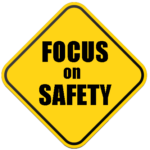 Don’t overdo it. Don’t try to lift more than you’re capable of. There’ll be plenty of time to gradually increase the poundages as you get stronger, but for now you need to focus on learning to use good form. You need to learn how to do the exercises so that you get the greatest benefit from them.
Don’t overdo it. Don’t try to lift more than you’re capable of. There’ll be plenty of time to gradually increase the poundages as you get stronger, but for now you need to focus on learning to use good form. You need to learn how to do the exercises so that you get the greatest benefit from them.
If you’re not careful you might slip into the routine of working very hard and thinking you’re making progress, but actually you’re not achieving much because your training methods are completely hopeless.
3 – Train just enough!
That might sound a bit strange, but the trick is to do just enough. If you do more than that you’re just burning up energy needlessly, and energy is a commodity you need more than ever if you’re trying to create new muscle. Of course if you do less than that you won’t see any worthwhile results either. So the trick is to stick to a proven routine, and work hard. And be patient!
4 – Do it right!
While we’re on the subject of doing just enough, learn correct form. As I said earlier, it’s easy to trick yourself into thinking you’re doing everything right just because you’re putting the effort in, but if you’re not doing it right you really are wasting at least some of that effort (and maybe most of it). Study the correct form, on this site or elsewhere, and it’ll pay dividends.
5 – Lift heavier, when you’re strong enough
As you get stronger (and assuming you’re doing it correctly) you’ll want to increase the weight you’re lifting. Do it gradually, and keep an eye on your form. Don’t let your form go just because the weight’s been increased. There’s just no point in that.
6 – Get plenty of rest
 You can train hard, and you can train a few days a week, but it’s very important to get your rest. That’s when your body actually repairs the damage incurred by the training. And if you’ve trained hard enough (i.e. put enough strain on your muscles) then your body will repair and rebuild them a little bit better, in order to cope with the workload that’s now expected.
You can train hard, and you can train a few days a week, but it’s very important to get your rest. That’s when your body actually repairs the damage incurred by the training. And if you’ve trained hard enough (i.e. put enough strain on your muscles) then your body will repair and rebuild them a little bit better, in order to cope with the workload that’s now expected.
7 – Eat well, but don’t overdo it
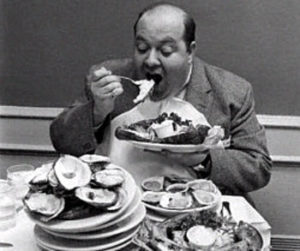
You’re training now, and putting strain on your body. It needs fuel to build new muscle, and it’s your job to provide it. Make sure you get plenty of protein for muscle building, and plenty of carbs for energy. And don’t make the mistake of trying to cut out all the fat from your diet – a healthy diet needs fat.
One last thing … don’t go overboard and just eat like there’s no tomorrow. You’ll grow alright, but a lot of that growth will just be a layer of fat, and muscles don’t look too impressive under a blanket of fat.
8 – Clean up your lifestyle!
If you’re putting in the hard work in the gym, and you’re being careful to stick to a healthy diet, don’t spoil it with bad habits.
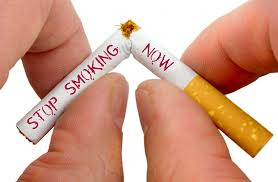 If you’ve been a smoker, quit now – it will affect your athletic performance, and later in life it can take its toll on your health (sometimes very severely).
If you’ve been a smoker, quit now – it will affect your athletic performance, and later in life it can take its toll on your health (sometimes very severely).
And if you’ve been more than an occasional drinker, curb that habit too. If you’re going to continue drinking more than is good for you, you might as well forget training – you’ll be trying to ride two horses at the same time, only they’re running in opposite directions.
9 – Focus on free weights, rather than machines
There’s nothing wrong with machines, regardless of what you might hear, but it’s very important, particularly as a beginner, to concentrate more on using barbells and dumbbells most of the time. You need to learn as much as possible about how to use your body effectively, and free weights is the way to go about it.
Machines tend to confine you to a certain range of movement, which isn’t always good for your joints. And they don’t always allow you to learn how to stay balanced and in full control throughout an exercise.
10 – Focus on ‘big’ exercises
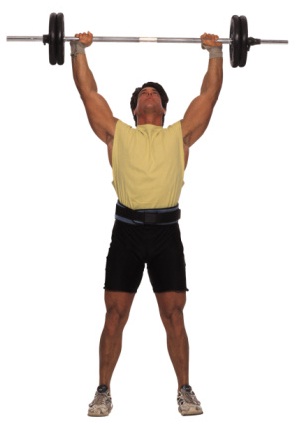 Compound exercises (I think of them as ‘big’ exercises) tend to work much more of your body than ‘small’, or isolation exercises. There’s really not much point in spending most of your time on something like lateral raises, when you could be doing things like deadlifts or squats.
Compound exercises (I think of them as ‘big’ exercises) tend to work much more of your body than ‘small’, or isolation exercises. There’s really not much point in spending most of your time on something like lateral raises, when you could be doing things like deadlifts or squats.
Those big exercises bring lots of muscle groups into play and effectively give you a whole-body workout. Isolation exercises, on the other hand, target much smaller areas and don’t affect the whole body in the same way.
11 – Learn good dietary habits and use them
 Learn about protein, carbohydrates and fats. Learn at least a little about vitamins and minerals. And learn the importance of having a plentiful supply of water in your system. And don’t just leave it at that – make sure you take on board what you’ve learned and start to eat a really sensible diet.
Learn about protein, carbohydrates and fats. Learn at least a little about vitamins and minerals. And learn the importance of having a plentiful supply of water in your system. And don’t just leave it at that – make sure you take on board what you’ve learned and start to eat a really sensible diet.
One of the biggest mistakes a beginner can make is to put a lot of effort into their training and then ruin it all by eating a totally unsuitable diet. That kind of approach is destined to fail.
12 – Develop a winning mentality
 By that I mean you should approach your training as though it really matters (which it does, of course). Put real effort into it. Anything less and you’re only short-changing yourself.
By that I mean you should approach your training as though it really matters (which it does, of course). Put real effort into it. Anything less and you’re only short-changing yourself.
And use visualisation – literally see yourself the way you intend to be in six months or a year from now. Be regular at the gym, and be a credit to yourself, acting in such a way that you’d be proud to overhear people talking about you.
13 – Stay highly motivated
Learn (and use) every method possible to maintain your motivation. You’ll find tips on motivation on this site, and elsewhere on the web. Do you really want to settle for training hard for, let’s say, six months, and then having a three-month lay off just because you’ve lost your motivation? Of course not. So make sure you employ whatever methods work for you to stay highly motivated, month after month.
By the way, I’m not saying you should never have a lay off. Taking a short break every once in a while can be a very good thing, but don’t just take that as an excuse to slacken off making an effort.
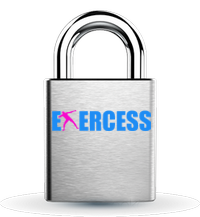
Sorry ... MEMBERS ONLY!
UNLOCK FOR FULL EXERCESS!EXERCESS is an online community of people who want to seriously improve their health and fitness, both mental and physical.
JOIN FREE TODAY!
… and get complete and unfettered access to an absolute goldmine of valuable information.
Already a member? Sign in!
